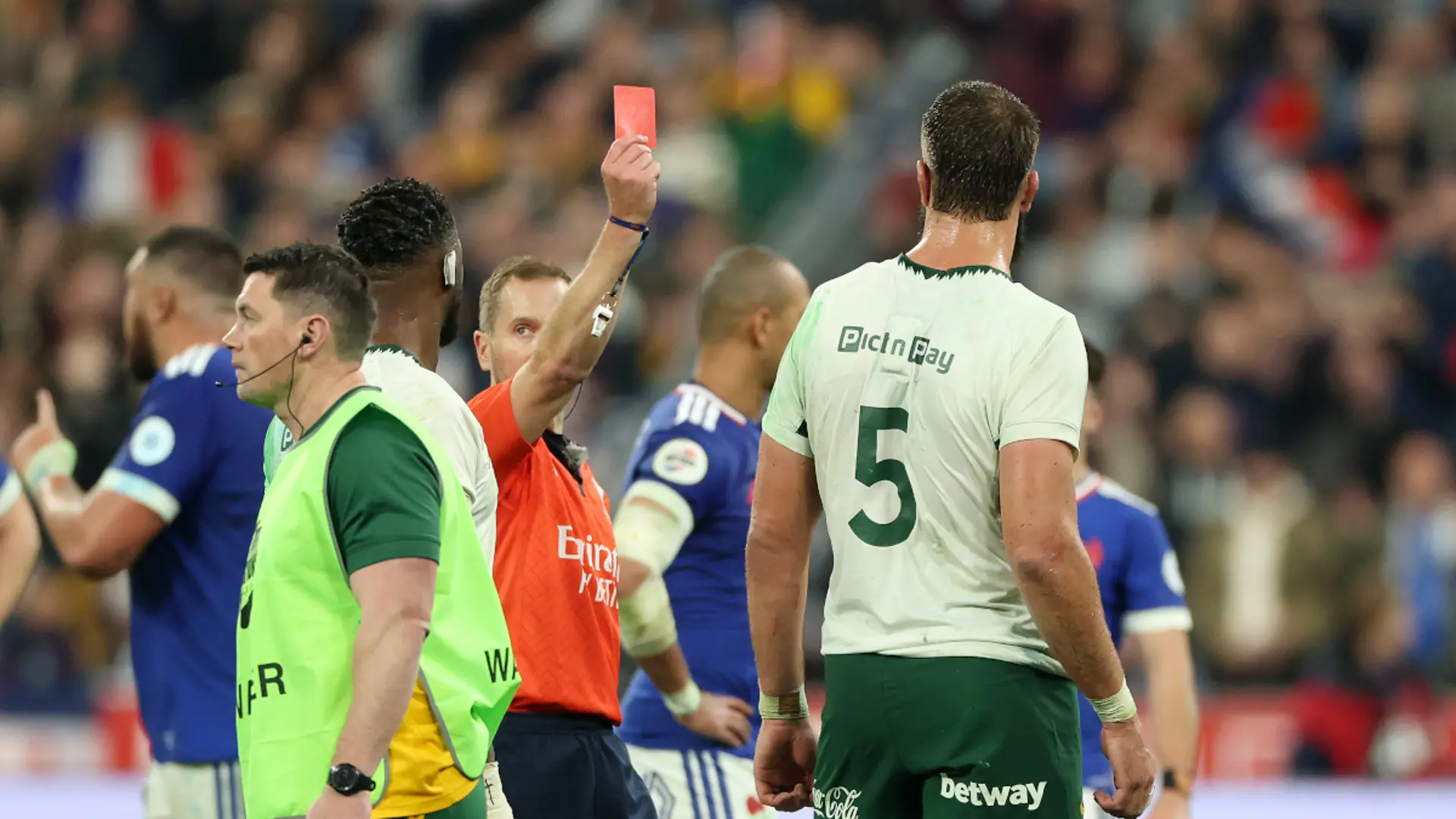The Springboks Red Card Controversy is no longer a sideshow, it is shaping the rhythm of South Africa’s tour and setting the emotional tone for a blockbuster week in Dublin. Two straight weekends, two permanent reds for Bok locks, two gritty victories, and a rising chorus of questions about consistency have pulled the world champions into a storm they did not invite, but one they continue to navigate with defiance and detail.
Two reds, two wins, and a team that adapts
In Paris, Lood de Jager saw red and South Africa still surged to a 32-17 win over France, then in Turin, Franco Mostert was sent off in the 11th minute and the Boks controlled Italy 32-14. That meant playing with 14 men for over 40 minutes in France and for 69 minutes in Italy, a punishing burden built around permanent reds that force early reshuffles.
Rassie Erasmus and Siya Kolisi did not hide the human cost. The captain was withdrawn at halftime in his 100th Test against France, then again on 45 minutes in Italy as the coaches rebuilt the pack on the fly. Erasmus called it unfair to individuals like Kolisi and Ben-Jason Dixon who had to make way, and his pride in the squad’s sacrifice was tempered by sadness for those who felt the brunt of decisions they believe were accidental in nature.
What happened in Turin and Paris
The Mostert incident in Turin became a flashpoint. New Zealand referee James Doleman, his assistants and the TMO judged direct head contact, no wrap and no mitigation, yet replays and subsequent analysis highlighted clear mitigation, with Mostert bent at the hips, initial contact on chest or shoulder, his right arm attempting a wrap and a second Bok tackler arriving. On any calm review, many argued it should have been a yellow at harshest and sent to the bunker review.
The week before in Paris, Angus Gardner produced a straight red for de Jager. That decision was described as borderline by some, and if it was contentious, the Mostert decision was widely labelled blatantly wrong. The pair of calls formed a pattern that South Africa cannot ignore as they prepare for Ireland.
Consistency questions and the wider weekend context
A sharper edge to the debate comes from comparison. Other fixtures featured high-contact moments that were not treated as severely, which deepens the frustration for the Boks. In Ireland against Australia, a controversial hit from Sam Prendergast on James O’Connor was not even reviewed by officials, while in Wales against Japan, a high tackle by Harry Hockings drew a yellow and went to bunker. The sense of uneven application, especially around the 20-minute red pathway and bunker usage, has become impossible to ignore.
There is also a precedent that lingers in memory. An Ireland forward, Beirne, received a red against the All Blacks in Chicago, which was later rescinded. Importantly, that decision was sent to the bunker and functioned as a 20-minute red, which limited its effect on the match. Sensible observers are asking why the bunker option was not employed in the Boks’ past two outings while it remains standard elsewhere.
Erasmus and Kolisi on hurt and African-ness
Erasmus chose his words carefully in Turin. He underlined that the team will review everything, and if their technique is wrong they will fix it, yet he also acknowledged a deeper dilemma, especially for tall locks asked to drop even lower in dynamic collisions. He believes the game is suffering, not only his players, and he returned to a phrase that has become a shield, it is what it is.
We have a way to adapt, but it is unfair to individuals like Siya and Ben-Jason Dixon, who received a chance for the first time in a long time, but had to leave the field early to make way for a lock replacement.
I always thought we wanted to get to 20-minute red cards and have a re-check on that. I thought it is the way to go, but it is not my place to talk about it.
We do not know how to coach guys any different. We are really in a fix. For a 2 m guy and a 2.06 m guy to go lower than a guy on his knees, it is tough.
Kolisi backed the sentiment, turning to the hard-earned identity that steadies this group. He spoke about the team’s unique African-ness, the habit of making plans in the chaos and buying into decisions together. In the changing room they saw the hurt in Mostert’s eyes, yet the captain’s message was simple, control what you can control and fight for every inch inside the four lines with all-in commitment.
Selection puzzle ahead of Ireland
The red card cloud now has practical implications for Dublin. A hearing is expected on Mostert’s card, and there is strong confidence it will be rescinded, which could free him for selection. That matters because Lood de Jager is already serving a four match ban and the Bok blueprint often relies on having two No 5 profiles across the starting pack and the Bomb Squad bench.
Ruan Nortje has been outstanding as a replacement in the last two games, a reassuring development while the coaches juggle options. South Africa did not call up a specialist No 5 from home, with experienced lineout leaders thin on the ground. Marvin Orie is now with the Sharks, and while JD Schickerling and Ruben van Heerden are capable, neither has been capped. For now, the staff has resisted pulling a new lock into the tour.
They did, however, bolster the front row. Erasmus confirmed the call-ups of Bongi Mbonambi and loosehead Ntuthuko Mchunu, citing the length of the tour and the calendar complication looming around Wales. Several players will not be eligible for the final match in Cardiff, which falls outside the international window, so bringing reinforcements in early increases depth and gets them back into the rhythm of Bok training.
This is a longer tour than usual, and we have two big matches lined up against Ireland and Wales, which prompted the decision to call up Bongi and Ntuthuko. Both players have done the job for us on the international stage, so we are excited to have them in the group.
Several players will not be eligible for selection for the final test on tour against Wales, as the match falls outside of the international window, so it makes sense to call up the players now to get back into the swing of things with us at training this week, while at the same time increasing the depth we have within the squad for our next challenge against Ireland.
Ireland resurgent and Dublin noise
If selection is one strand, the atmosphere will be another. Ireland’s 46-19 win over Australia at the Aviva Stadium lifted spirits and confidence, and when Dublin feels good, the volume climbs. The Springboks have grown used to this soundtrack, and they have learned how to tune out the noise as well as anyone in the sport.
They have done it before. In Tokyo Bay during the 2019 World Cup build-up, off-beat media lines tried to pull focus, and last year the Bongi Mbonambi and Tom Curry saga rippled through the week before the World Cup final. Now, the social feeds are buzzing again, with jokes about a red box over the No 5 on the team sheet and a podcast quip suggesting a tongue-in-cheek 14-man selection. The Boks can smile at the memes, but underneath the humour sits an important truth, they need 15 on the field when Ireland hit their stride.
The refereeing picture and what must change
The laws and the guidance around head contact aim to protect players, which everyone supports. The question is whether the framework is being applied evenly, in real time, across venues and competitions. When one game sees a straight red with no bunker review, and another sees a similar or worse collision handled as a yellow with bunker oversight, trust frays. That is where this moment is most precarious for the sport, because consistency is the foundation of credibility.
World Rugby’s own explanation frames a permanent straight red as an act of thuggery or a dirty act seen in a game. Neither de Jager nor Mostert fits that description. Both were clearly attempting legitimate tackles, bent at the hips, with mitigation present. Plenty of observers believe the path to fewer flashpoints is simple, send borderline incidents to the bunker, use the 20-minute red, and save straight red for truly egregious acts.
The stakes for Dublin
South Africa’s resilience under pressure has been compelling, but Ireland will ask different questions. Their attacking shape returned against Australia, and the Wallabies were drained by a long season. In that context, the Boks will want stability, which means clean discipline, accurate tackle height and a full deck of options off the bench. It also means clarity on Mostert, whose availability would balance the pack and preserve the match-day plan.
The team announcement is due on Thursday, a moment that will crystallize Erasmus’ approach. Whether it brings continuity or a surprise, it will be shaped by the same practical reality as the past fortnight, plan for turbulence, then play with conviction. The coaching group will keep hammering their technique, and if there are corrections to make, they will make them.
Key questions to watch
- Will the Mostert hearing clear him in time,
- Will the bunker be used consistently if a high contact call arises,
- Can the Boks keep 15 on the field and unleash their full rotation.
Beyond the controversy, the human edge
Strip away the angles and the calculations, and what remains is the human pulse of this team. Kolisi’s quiet acceptance as he walks off early, Mostert’s stare on the sideline, the forwards huddling to reassign duties and the backs recalibrating their kick-chase. The Boks have embraced a mentality that meets chaos with order and meets adversity with togetherness.
That is why the results matter, because they reaffirm something bigger than a scoreline. Two wins with 14 men underline toughness, cohesion and a clarity of purpose that does not yield to circumstance. Dublin will be loud, the scrutiny will be intense and the red card conversation will not fade overnight. The Springboks cannot control the whistle, but they can keep controlling effort, system and belief.
In the end, the story of this tour might be about the same balance Erasmus is seeking. Protect the players, pursue excellence, and fix what needs fixing, yet let the game breathe. If the officials match that balance with consistency, the spectacle will flourish. If the Boks get Mostert available and keep their tackle height true, their best version will step into the Aviva with a chance to turn controversy into clarity, and the noise into fuel.






